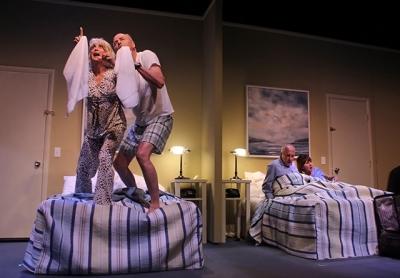Slapstick With a Higher Purpose in Quogue

At first glance, “Alarms and Excursions,” running now through June 11 at the Hampton Theatre Company in Quogue, seems a light romp about the tribulations of contemporary life. Its playwright, Michael Frayn, also wrote “Noises Off,” the hugely successful comedy of manners from the early 1980s. Like its predecessor, “Alarms and Excursions” has plenty of slapstick humor, but it ultimately aims for bigger targets than mere laughs.
This production is a slightly abridged version of the original, first performed in London in 1998. The play is a loosely connected series of vignettes about married British couples. Most of the pieces work beautifully, with one or two being merely good.
The first — a kinetic sketch about modern technology — is perhaps the funniest. Two couples meet for drinks in an upper-middle-class home. Once introduced they all decide to turn off their cellphones — they are going to chat, face to face, in the human way of the civilized elite. The host produces a bottle of wine, of course, but with a curious-looking wine opener. This gadget, it turns out, is so complicated it’s like something pulled out of the gearbox of the Millennium Falcon. No one can figure out how to use it, though the host, in his failed attempts to implement it, keeps insisting that it is “easier.”
Then a loud, stringent beep is heard, though no one can figure out where it’s coming from. When they discover it’s the smoke alarm, no one can figure out how to open it to replace the battery. The host continues to fumble with the bottle opener — “Where’s the damned wine?” one of the guests anxiously wants to know. The oven alarm sounds, along with the telephone (whose answering machine malfunctions), and then in all the scurrying around the burglar alarm is accidentally set off. What is the security code? No one can remember. One of the guests, now desperate for wine amid all the mayhem and stress, cuts her hand open on the impossible bottle opener.
While all of this is extremely funny, and the slapstick expertly choreographed by the director, Diana Marbury, the playwright is also cleverly raising a question: Are all the gadgets we surround ourselves with serving us, or are we being served?
The cast is no less than a knockout, featuring Rosemary Cline, Jane Lowe Baldwin, George A. Loizides, and Andrew Botsford. The characters in Mr. Frayn’s play are nameless — though sometimes misnamed by each other — so that there’s no attaching an actor to a character. On the opening night performance that I witnessed, the comic timing (essential to the play) was crackling, and the blocking, even in some of the more slapdash episodes, perfectly executed. It would be unfair to single out a performance with a cast so balanced and equally matched.
It’s an ensemble that reaches its height in the play’s last sketch, an extended farce with echoes of Samuel Beckett. Two middle-aged couples on a European holiday enter parallel rooms where their every move and thought seem to parrot one another. One of each of the couples wants sex, the other doesn’t. One talks too much, the other is too quiet. The hotel rooms, both couples notice, look just like yesterday’s hotel rooms, even though they were in another country; the same complimentary tea is offered, the same biscuits. Neither couple seems to be having much fun, and, when asked, they can’t even articulate why they’ve come on this holiday, as if the whole thing were somehow obligatory.
The episode, while wildly funny, is also, in its way, quite creepy. It’s as if the world and its people were becoming uniform, marching to orders they can’t understand and don’t really wish to follow. And the audience’s laughter — born directly from their identifying with it all — only confirms the playwright’s theme.
There are two other sketches — one about a blue-blood couple who finish each other’s sentences, and another about a lower-middle-class couple whose inability to articulate the infrastructure of their house seems a metaphor for their distant relationship. Compared to the larger set pieces mentioned here, these are middling sketches. But no matter. They are brief, and an example of an expert playwright knowing when a joke is thin and quickly exhausted.
The great majority of “Alarms and Excursions” is hugely enjoyable, if sneakily unsettling, and a fine kick-off to the Hampton Theatre Company’s summer season.
